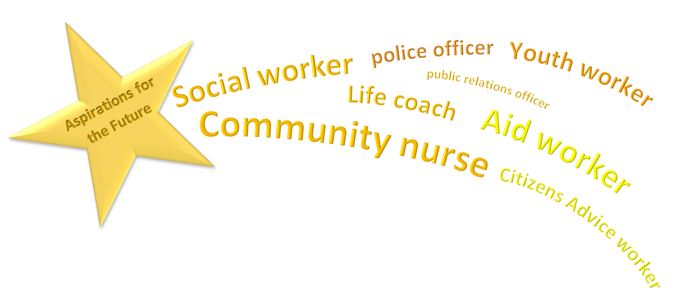
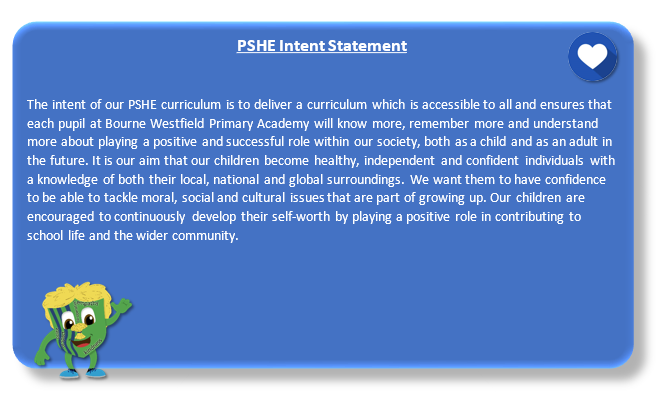
Implementation
At Bourne Westfield, the Jigsaw scheme is used to teach PSHE and RSE. The concepts taught through these main concepts:
- Being me in my world
- Celebrating differences
- Dreams and goals
- Healthy me
- Relationships
- Changing me.
These key concepts underpin learning in each year group. This enables pupils to reinforce and build upon prior learning, make connections and develop subject specific language.
The vertical accumulation of knowledge and skills from Years 1 to 6 is mapped as follows:
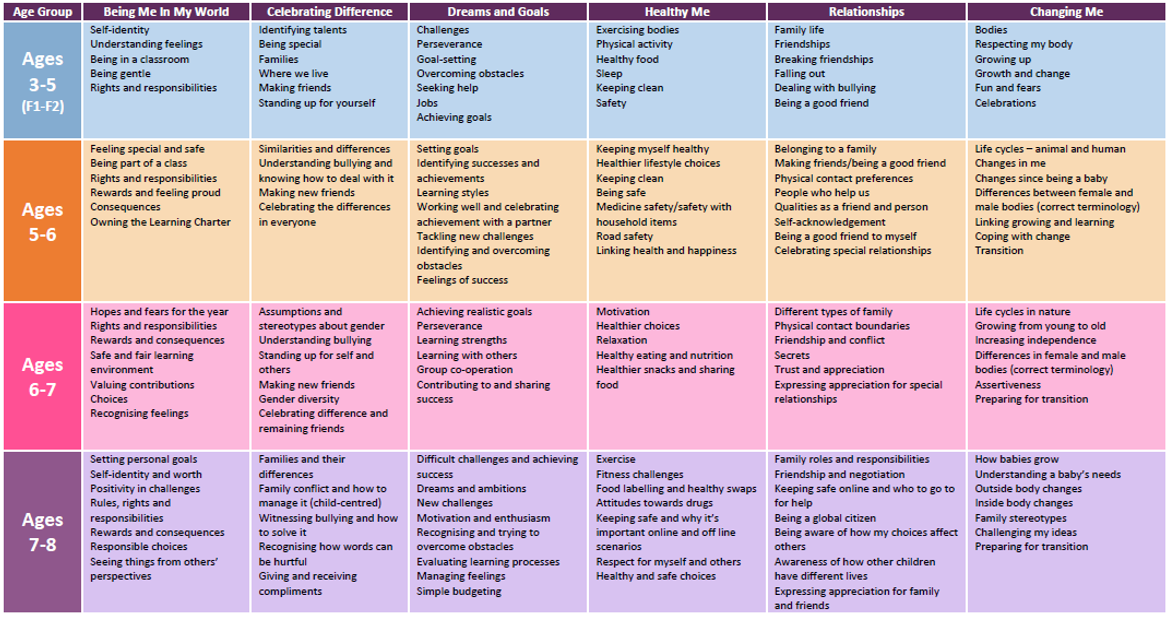
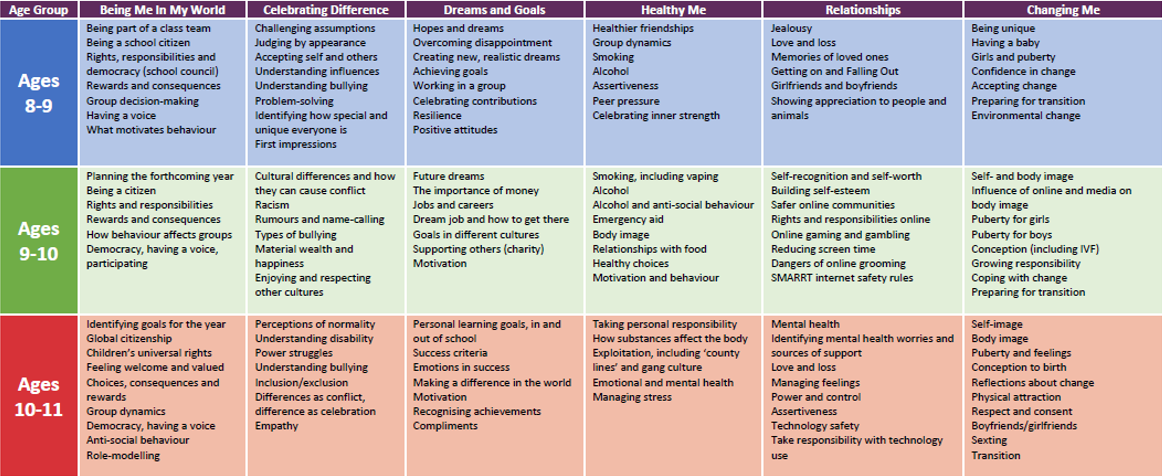
Thank you to those parents ho rsponded to the consulation. Parental suggestions have been considered a a small change to the policy has been made. The new policy for 2024 can be found here.
For speific infomration regarding how Jigsaw teaches children about LGBT+ relationships, gender and protected charcateristics please see the documents below:
Including and valuing ALL children What does Jigsaw PSHE 3-11/12 teach about LGBT+ relationships?
Protected characteristics Ofsted and Jigsaw PSHE 3-11/12
Jigsaw, the mindful approach to PSHE ages 3-11. How does Jigsaw approach gender identity?
Protected Characteristics
The Equality Act came into force from October 2010 providing a modern, single legal framework with clear, streamlined law to more effectively tackle disadvantage and discrimination. It stated that it is against the law (UK) to discriminate against anyone because of:
• age
• being or becoming a transsexual person
• being married or in a civil partnership
• being pregnant or on maternity leave
• disability
• race including colour, nationality, ethnic or national origin
• religion, belief or lack of religion/belief
• sex
• sexual orientation
These are called ‘protected characteristics’, and schools have a duty of care to protect all pupils from discrimination or harassment. Jigsaw PSHE helps schools understand and promote these characteristics more fully and in a childcentred way. The Puzzle ‘Celebrating Difference’ focuses on similarities and differences and teaches about diversity, such as disability, racism, power, friendships, and conflict; children learn to accept everyone’s right to ‘difference’, and most year groups explore the concept of ‘normal’; bullying – what it is and what it isn’t, including cyber and homophobic bullying – is an important aspect of this Puzzle.
The Relationships Puzzle also has a wide focus, looking at diverse topics such as families, friendships, pets and animals, and love and loss – all of which can help to deliver the vital messages behind the Equalities Act. A vital part of this Puzzle is about safeguarding and keeping children safe; this links to cyber safety and social networking, as well as attraction and assertiveness; children learn how to deal with conflict, their own strengths and self-esteem. They have the chance to explore roles and responsibilities in families, and look at stereotypes. All Jigsaw lessons are delivered in an age- and stage-appropriate way so that they meet children’s needs and can help them understand the wider world.
We have aligned their Jigsaw PSHE lessons to the Equality Act. The grid below shows how particular Jigsaw lessons address these themes:
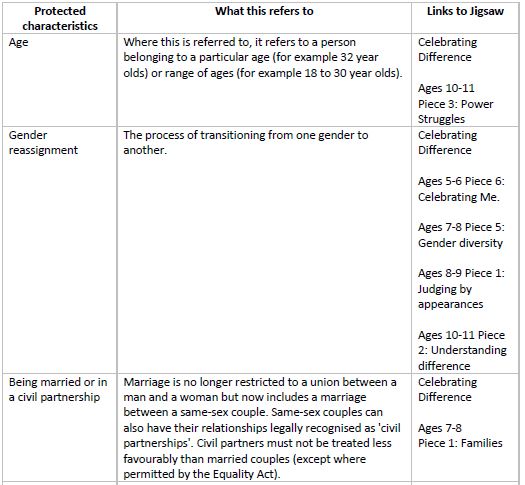
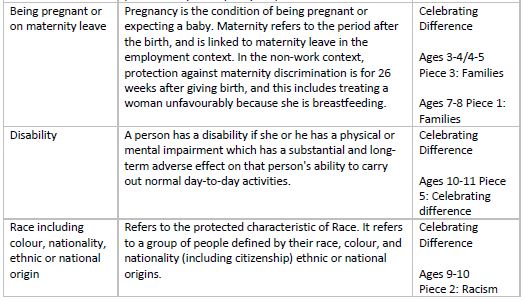
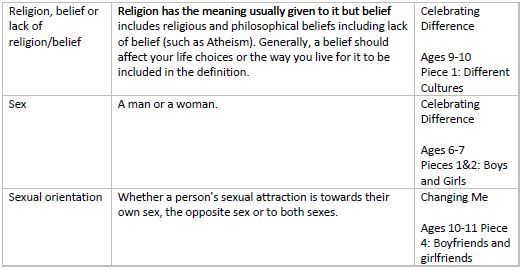
British Values
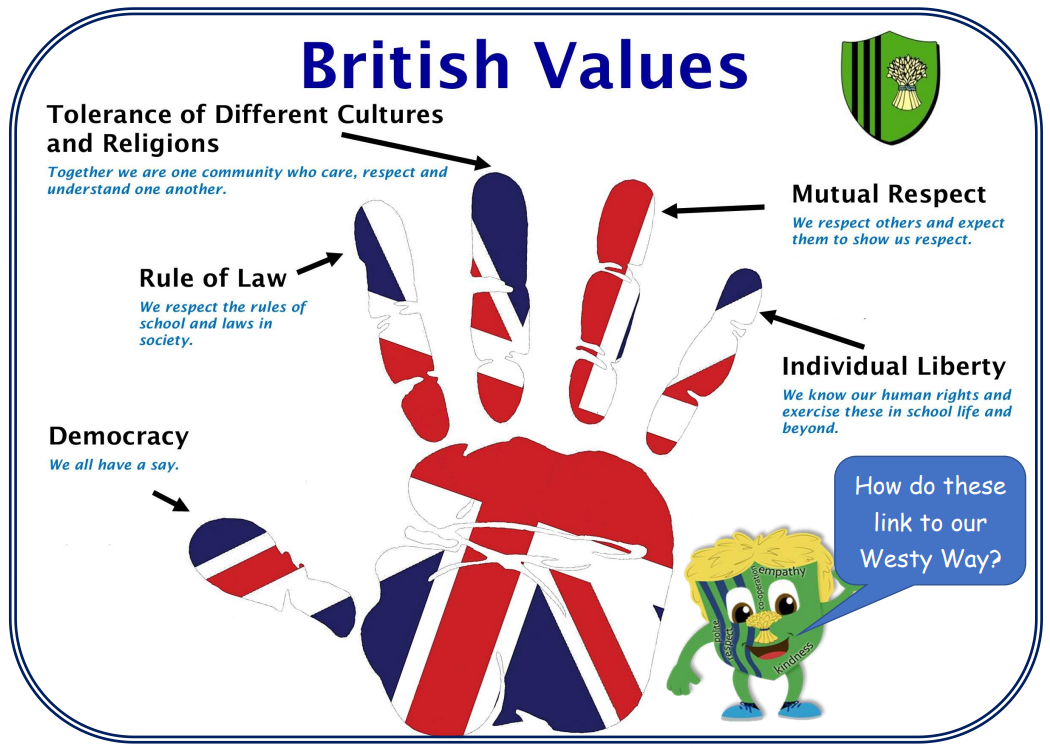
Here at Bourne Westfield, the children learn about British Values through assemblies, PSHE and the wider curriculum. We also ensure that the children are 'living' these values in school. We hope that through the promotion of British Values, children will have:
- An understanding of how citizens can influence decision-making through the democratic process
- An appreciation that living under the rule of law protects individual citizens and is essential for their wellbeing and safety
- An understanding that the freedom to choose and hold other faiths and beliefs is protected in law
- An acceptance that other people having different faiths or beliefs to oneself (or having none) should be accepted and tolerated, and should not be the cause of prejudicial or discriminatory behaviour
- An understanding of the importance of identifying and combating discrimination
Some ways in which we teach or provide experiences for children are:
Democracy
Democracy is embedded at the school. Pupils are always listened to by adults and are taught to listen carefully and with concern to each other, respecting the right of every individual to have their opinions and voices heard. Pupils also have the opportunity to air their opinions and ideas through our School Council and regular pupil voice. The elections of the School Council members is based solely on pupil votes, reflecting our British electoral system and demonstrating democracy in action. The children also have the opportunity to develop oracy skills through debate. The History curriculum teaches children about how democracy was not always evident in the past and how this affected society. In addition, we organise visits from a local councillor and Mayor.
Rule of Law
The importance of laws whether they are those that govern the class, the school or the country, are consistently reinforced throughout our school day, through our school assemblies and also when dealing with behaviour in school. We encourage our pupils to distinguish right from wrong and help pupils to understand that living under the rule of law protects individuals. Our pupils are taught the value and reasons behind laws, that they govern and protect us, the responsibilities that this involves and the consequences when laws are broken. Visits from the Police, Magistrates etc. also help to reinforce our messages. Our restorative justice approach helps us to resolve conflicts - staff carry restorative questions on them to aid this process.
Tolerance of Difference Faiths and Religions
Our Westy Way ensures tolerance of those who have different faiths and beliefs. Bourne Westfield enhances pupils' understanding of different faiths and beliefs through religious education studies; PSHE work; welcoming visitors that are not predominately white British, and enjoying a depth of study about other cultures and belief systems during themed Arts Week. Children and staff from all faiths have the opportunity to share their celebrations and religious beliefs during assemblies. The school also welcomes local faith leaders to lead assemblies of support the teaching of RE as well as visits to places of worship from different religions.
Mutual Respect
Respect is promoted across the school and it is deeply embedded in all that we do. The pupils know and understand that it is expected and imperative that respect is shown to everyone, no matter what role they work in or whatever differences we may have. The core value of Commitment, Opportunity, Respect and Excellence influence our work every day both in and out of the classroom. Our school frequently participates in learning activities which promote mutual respect including visits to local nursing homes for the elderly, welcoming visitors and other school trips. The school also promotes openness and honesty in a safe environment. Children are able to discuss their differences and expect to be respected - pupils with SEND are able to share they needs to enable others to better understand them. Children are taught to Expect Respect through the Expect Respect Healthy Relationships Toolkit. A very wide range of extra-curricular clubs are offered both at lunchtime and after the school day. These clubs provide another opportunity for mutual respect to be secured in the attitudes of our pupils, both amongst those participating from their own setting, and any visiting staff or teams.
Individual Liberty
Within school, pupils are actively encouraged to make choices, knowing that they are in a safe and supportive environment. As a school we educate and provide boundaries for our pupils to make choices safely, through the provision of a safe environment and an empowering education. We support pupils to develop their self-knowledge, self-esteem and self-confidence - a focus on oracy and the ability to debate and share one's thoughts is a priority. Our pupils are encouraged to know, understand and exercise their rights and personal freedoms and are advised how to exercise these safely; examples of this can be clearly seen in our e-safety and PSHE lessons. We implement a strong anti-bullying culture and pride ourselves on being a Telling School, using the NSPCC Speak Out, Stay Safe resources to support this. Pupils are taught about LGBTQ+ rights through assemblies and the wider curriculum.











